What Causes Rough Idling & How Do You Fix It?
In this article we will be looking at one of the most common signs of an engine that is not working correctly, the rough idle. This is a noticeable change that matters when drivers report when something starts to go wrong under the hood.
We are going to take a look at what might cause rough idling as well as some potential fixes for the problem. So if the way your car acts while idling has recently changed read on, we may have the answers you seek.
What Is Rough Idling?
The best place to start is always to clarify what we mean by rough idling. This phrase is used to describe when an engine has stopped running as smoothly as it should and begins to fluctuate audibly and physically.
When the car is idling everything is at its most sensitive so issues with the engine can be the most noticeable. If you start your engine and are waiting to pull away you may notice excessive vibrations and noise coming from the engine.
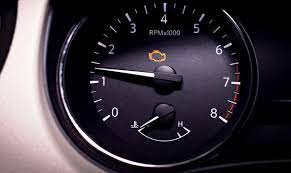
At idle most vehicles maintain a steady 600 – 1200 RPMs if this starts to fluctuate then you likely have a rough idle. It is generally caused by an imbalance in the rhythm of the internal combustion engine. This should normally be well timed and controlled but little things can throw this off and as a result you have a potentially growing issue.
What Are the Causes of Rough Idle?
I wish we could tell you that the answer to what causes rough idle is simple but the truth is there are so many potential causes you will likely have to do some detective work. The ignition sequences of our engines are complex and a lot goes into making them run smoothly.
With so many factors at play there are a lot of potential reasons that the engine will become unbalanced. We are going to try and hit upon some of the most common reasons in this section and also help you find resolutions to them.
Defective PCV Valve
A common cause of a rough idle is the Positive Crankcase Ventilation (PCV) valve. This valve takes the unburned gases that escape the engine cylinders from the crankcase and reintroduces them to the engine to be used in another combustion.
This valve being inside the engine is prone to contaminants such as dirt and sludge that are created by the combustions within the cylinders. These contaminants will build up over time and may cause blockages.
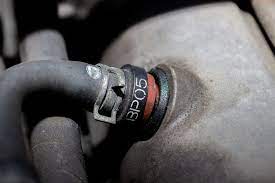
These blockages affect the efficiency of the engine and may also cause leaks in the system. This in turn can impact the fuel/air mixture often creating what is known as a lean mix. When the fuel/air mixture is lean it means there is not enough fuel and that the combustion events may not be as strong as they should be or worse they may not happen at all.
Missing a cylinder ignition is known as a misfire and this will definitely cause a rough idle. To fix this issue you will either have to clean the PCV valve or if it is damaged it may need to be replaced.
Bad Oxygen Sensors
The air/fuel mix in modern cars is controlled by the vehicle's computer and is adjusted to meet the specific needs of the car throughout running. As part of this process sensors take readings to ensure the mix used is the best to maintain engine performance.
Oxygen or O2 sensors sit in your exhaust one before and one after your catalytic converter. As the name suggests they monitor the oxygen in your emissions to determine the proper fuel/air mixture to keep your engine running smoothly.
These sensors however can easily wear out from the high exhaust temperatures or become dirty making them less useful. If the correct information is not being supplied by these sensors then this can cause an incorrect fuel/air mix.
The results of an O2 sensor issue can again be a lean fuel/air mixture and misfires. If an O2 sensor has failed you can use an OBD2 scanner tool to locate which one is not working correctly. The next step would be to clean or replace it if need be.
Vacuum Leak
Everything happening inside our engines is occurring in a vacuum that maintains a certain amount of pressure to ensure the best combustion conditions. This vacuum is created by sealing the engine and controlling the pressure through vacuum hoses.
These vacuum hoses are very evident when you look at the engine and they are important to keeping conditions in the engine perfect. They can of course like all automotive hoses become brittle and crack over time. When this happens the vacuum can not be sustained.
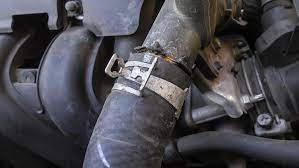
The result of a vacuum leak then may be lean air/fuel mixtures and poor combustion events. This issue can also occur from leaks in the vacuum supply tanks, brake boosters and intake manifold gaskets. Often when driving things will seem fine but at idle you will have a rough engine.
If you check the car's trouble codes with an OBD2 scanner it may indicate a vacuum leak so your next step would be to locate it and fix the problem. You may need an EVAP smoke machine for this as it will allow you to visually locate where the air is escaping the system.
Clogged Air Filter
This is a simple part and a very easy fix so if you determine this to be the issue then you are very lucky. The air filter helps to keep outside contaminants from entering the engine which is important. These contaminants build up on the filter and eventually it reaches a level where air can no longer get into the engine.
This will cause a rough idle as it impacts the fuel/air mixture. It is easily fixed by locating the air filter, removing the old one and replacing it with another. Many oil change places will actually do this for a small fee as part of your regular oil maintenance.
Dirty Fuel Injectors
If your vehicle has a fuel injected engine these injectors can definitely be the cause of a rough idle. Over time they can become dirty and get restricted which obviously affects the flow of your fuel to the cylinders.
This can be avoided by using fuel with special additives that limit build up on the injectors. Many injector systems will also have a filter for the fuel injectors which should be regularly changed. If the build up becomes too advanced however you may have to have an injectable solution added to the system to clear the clog.
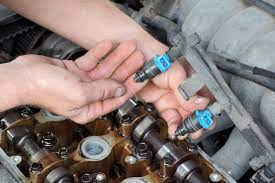
In extreme cases you may have to replace the fuel injectors entirely which is a big expense. Regular maintenance and the right fuel however should prevent this issue in the first place.
Low Compression
This is a problem that is more frequent in older cars but can sometimes happen with newer models as well. Compression is needed as part of the combustion process so if the engine compression is not sufficient you can get misfires.
There can be a number of causes for low compression so you will want to check what the OBD2 scanner tool has to tell you. This is often a costly repair so be prepared for that. It will also require a compression test.
Carburetor Issues
Again this is an issue for older cars as more modern vehicles no longer use carburetors. If you have a rough idle and your exhaust is producing black smoke, assuming your car has a carburetor this may be the problem.
This is one of those parts that can wear out over time and develop issues. The ethanol in gasoline is particularly hard on carburetors. The likelihood is that you will need to replace the part to get this resolved.
Spark Plugs
In the engine's cylinders you have a mixture of fuel and air which is compressed and then needs to be ignited. This is done using the aptly named spark plugs. They produce the spark that lights the fuel air mixture.
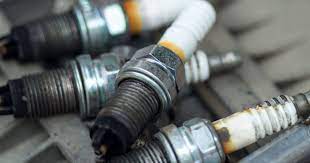
These plugs wear out over time and can become dirty from fuel, oil and soot. Changing spark plugs should be part of regular maintenance and you should find advice on how often to do this in your owner's manual.
Exhaust Gas Recirculation (EGR) Valve
The EGR valve as the name would suggest recirculates exhaust gases but to where exactly? This valve will actually send a portion of the exhaust gases from the cylinders back into the cylinders to help with the next combustion event.
These exhaust gases cool the cylinder so that when the fuel flows in it does not accidentally ignite from the heat of the previous burn. It also makes the whole process more efficient and improves overall engine performance.
When this valve does not do its job then you may get cylinder misfires, poor engine performance but oddly better fuel economy. This is not a good thing however as misfires can be very damaging to the engine.
The important fact here however is that the EGR should not be doing anything while the car is idling. If it is then the valve must be stuck open and this needs to be fixed quickly. It may just require a cleaning or you may need to get the part replaced.
Can You Drive With a Rough Idle?
The temptation to ignore a rough idle is understandable because the car is still working but it just feels a little rough. As you do not know the reason for the rough idle without looking into the issue however ignoring the problem is not advised.
Generally speaking whatever the issue is, the result is likely poor combustion in the cylinders or misfires. This is not good for the engine and if left unfixed can cause very expensive damage. You might be able to drive now but before too long you will have to fix it and it will cost you more later.
Conclusion
Rough idle may not seem like a huge issue until you consider the reason is likely misfiring cylinders. This misfire can occur for a host of reasons so a diagnostic tool like an OBD2 scanner can be your friend in this situation. Once you know the problem, get it resolved without delay.
Link To or Reference This Page
We spend a lot of time collecting, cleaning, merging, and formatting the data that is shown on the site to be as useful to you as possible.
If you found the data or information on this page useful in your research, please use the tool below to properly cite or reference Tow Ratings as the source. We appreciate your support!
-
<a href="http://towratings.net/blog/what-causes-rough-idling-how-do-you-fix-it/">What Causes Rough Idling & How Do You Fix It?</a>
-
"What Causes Rough Idling & How Do You Fix It?". Tow Ratings. Accessed on July 27, 2024. http://towratings.net/blog/what-causes-rough-idling-how-do-you-fix-it/.
-
"What Causes Rough Idling & How Do You Fix It?". Tow Ratings, http://towratings.net/blog/what-causes-rough-idling-how-do-you-fix-it/. Accessed 27 July, 2024
-
What Causes Rough Idling & How Do You Fix It?. Tow Ratings. Retrieved from http://towratings.net/blog/what-causes-rough-idling-how-do-you-fix-it/.